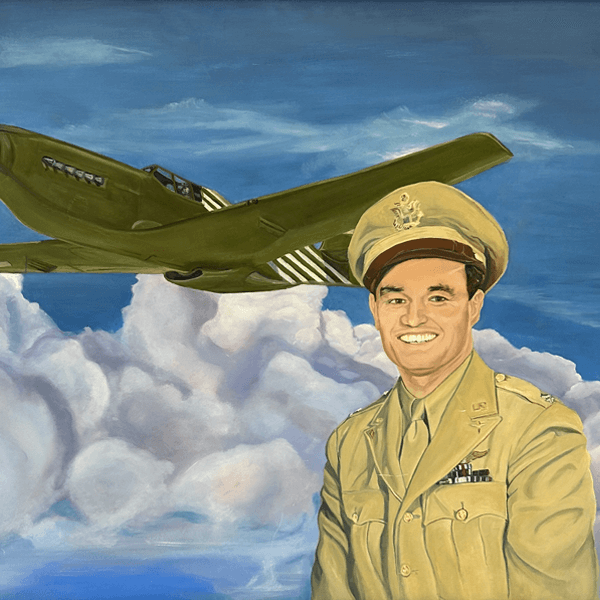Colonel Philip G. Cochran

Colonel Philip G. Cochran
Born into a close Irish-American family in Erie, Pennsylvania in 1910, Philip G. Cochran made his was through college during the economic depression working odd jobs and singing in bands. In 1935, Cochran graduated from Ohio State University and entered Army pilot training in 1936.
He graduated to P-6s with the 33rd Pursuit Squadron on the 8th Pursuit Group at Langley Field, Virginia. In four years, Cochran rose from flying cadet to Squadron commander of the 33rd. Early in World War II, he played a major role in the build-up of fighter squadrons and the development of tactics to match the new fighters. Cochran would with fellow fighter leader Johnny Alison. He also spent time with the famed cartoonist Milton Caniff, who was an Ohio State graduate as well. Caniff even based his Terry and the Pirates character “Flip Corkin” on Cochran. During Operation Torch in North Africa, Cochran led the “Joker Squadron” of the 33rd Fighter Group in Army P-40s off the British Carrier Archer. Later he led the 58th Fighter Squadron of the 33rd Group in combat throughout North Africa. Colonel Cochran helped train and introduced into combat the first all-black 99th Fighter Squadron. He left North Africa with a reputation as a proven unorthodox combat leader. His North Africa fame earned him the attention of General Hap Arnold. General Arnold picked Cochran and Alison to lead project NINE, later called the 1st Air Commando Group. The top-secret mission of this composite group was to support British General Orde C. Wingate and his “Chindits” in Burma. Together, as part of Operation Thursday, the Chindits and Air Commandos accomplished the first actual night combat airfield seizure operation when they assaulted a jungle clearing and built Broadway Airstrip 165 miles behind Japanese lines. Nine thousand troops and tons of supplies were airlifted into Broadway in five days. The Air Commando composite force of fighters, bombers, transports, gliders, light planes, and helicopters provided reconnaissance, combat air patrol, air landing, air lift, interdiction, close air support, re-supply, and medevac to the Chindit force. Colonel Cochran later played part in the planning the invasion of France and Germany. He retired from the military in 1946 for health reasons. As the U.S. Air Force came into being, Milton Caniff started a new comic series called Steve Canton, in which Cochran was the role model for the character “General Philippe.” Cochran then worked for Howard Hughes’ RKO Movies as an aviation advisor. He managed some of the first jet filming ever attempted while flying copilot in a B-47 camera ship for the movie “Jet Pilot.” Later he returned home to Erie to serve in his brother’s business, Lyons Trucking. Over the years he rose to president of Lyons and helped expand it into a nationwide company. While serving his country, he earned the Distinguished Service Medal, Silver Star, Distinguished Flying Cross with three oak leaf clusters, Air Medal with four oak leaf clusters, Soldiers Medal, and British Guene with star and palm leaf. As an avocation, he took to riding and breeding horses. He died on horseback of a heart attack during a foxhunt at age 69.

